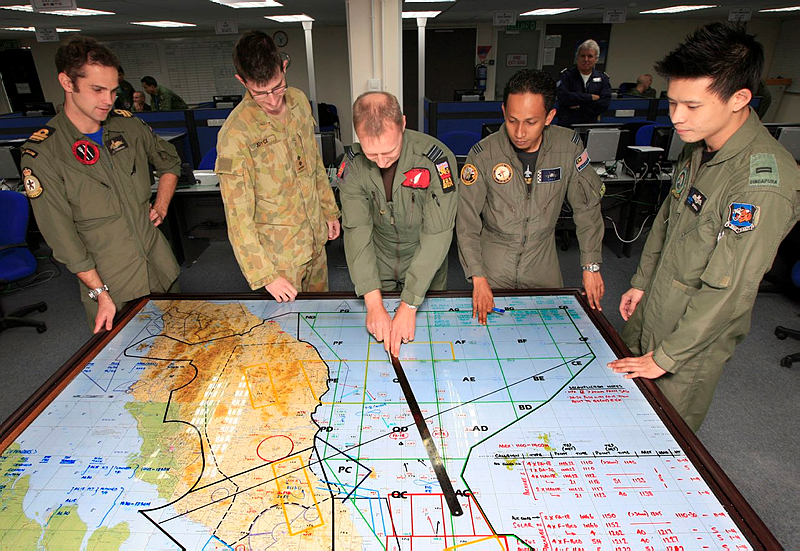
Republished with permission from The Central Blue
In this post, Emily Chapman makes the case for increased ‘jointness’ in professional education, outlining a number of proposals to increase collaboration across the services and prevent silos of intellectual excellence.
A single RAAF Officer pitched to a predominately Army audience on the need for a Joint Professional Military Education (PME) Association at the inaugural Defence Entrepreneurs Australia Forum in December 2016. As that Officer, I can attest that it was driven by a zealous quest for a joint perspective to be heard in a land-focused forum at a time when the ADF is consolidating joint capabilities, such as the Landing Helicopter Docks. With no Service deploying in isolation, our intellectual debate should be conducted similarly.
Mapping online intellectual military debate in Australia identifies Grounded Curiosity, Logistics in War, The Dead Prussian, the Australian Army’s Land Power Forum, The Cove and lastly, to my knowledge, The Central Blue. The latter is dedicated to air power, however it also publishes debate critical for land forces, including (for example) ‘A Day Without an ATO,’ which resulted in dialogue between the author, Squadron Leader Chris ‘Guiness’ McInnes, and Colonel Chris Smith.
A recent Grounded Curiosity publication that resonated considerably was MAJGEN McLachlan’s article titled ‘What is Modern Military Leadership? A Primer’. Whilst Army- focused, it has a very strong and powerful message that modern military leadership is “inspirational” and “authentic,” with authority “based on ethical behaviour and professional mastery, not simply the badges of rank they wear.” This message is applicable to Navy and Air Force leaders, both within single-service and joint environments. Military leaders often find themselves building diverse teams and this primer is a key theoretical building block. I am curious to know how many Air Force and Navy personnel read it.
Without concentrated and joint effort, there is a risk that online platforms will continue to publish debate valuable for all Services but be unconnected to other Service audiences; both in terms of Service-focused debate and being on different websites. The risk of silos of intellectual excellence being raised between Services is therefore high.
As an idea pitcher, Post DEF[X] 2016 I was asked ‘What does success look like for your idea in 2017’? I found it hard to respond. With considerable commitments already could I try and solve the issue I first raised of a joint PME Association? With the publication of Kelly Dunne’s reluctant professional reading journey, it became clear that there is always time to commit to joint intellectual debate and to urge others to consider the joint space. So, I remain engaged, and now turn to how I think we can achieve stronger intellectual ties between the Services.
The Cove is growing considerably, with over 100,000 views in four months, but does not have any visible direct links to The Central Blue. The Central Blue has a category ‘Army’ but no direct link to any land-focused websites. A very simple solution is prominent links on both of these websites to other Service websites and resources. I understand there to be some work in both developing and connecting Service websites, so it will be good to see the visible progress.
Of most intellectual benefit would be the creation of an ADF website that collates Service dialogue based on themes of air, land and naval debate, and that covers all levels of war. The viability of Vice Chief of Defence Force Group establishing such a website under the Australian Defence College should be considered. People will be able to visit one source and be able to engage across multiple domains and operational levels; thinking, discussing and writing more joint will follow. Such a website would build upon the publication of the Australian Defence Force Journal and link the intellectual debate that occurs through the joint training continuum, commencing at the Australian Defence Force Academy for some.
Secondly, a Postern Association workshop is proposed that will see its vision and purpose become more widely known. The agenda for this workshop could include discussion on how to establish Air Force and Navy professional development association equivalents, and an overarching ADF PME Association as pitched to DEF 2016. This workshop can formalise the establishment of an Air Force Liaison Position and work towards engaging Navy in order to commence sharing Service knowledge, process and practices.
A third joint opportunity is the annual DEF Aus Forum. DEF Aus is a platform to voice innovation and engage with decision makers on implementing this innovation within Defence, not just Army. The event needs to be more widely advertised across the Services and via Service websites. A DEF Aus symbol should be prominent on The Central Blue, linking innovate thinkers with existing opportunities to pitch their ideas.
Chief of Air Force, Air Marshal Leo Davies states in Air Force Strategy 2017-2027 that Air Force will “promote a commitment to ‘jointness’ in Air Force culture such that Air Force members recognise their own capabilities as operating primarily on behalf of the whole ADF.” This gives Air Force personnel guidance to intellectually start talking joint. It can very simply be done, as proposed in this article. Get passionate, get involved in DEF Aus and drive ADF intellectual dialogue and innovation.
About the author
Emily Chapman is a RAAF Reservist posted to the Air Liaison Organisation. She is concurrently a PhD candidate researching civil-military interaction in disaster relief operations at UNSW Canberra. Her research interests include Defence learning processes, practices and mechanisms.

